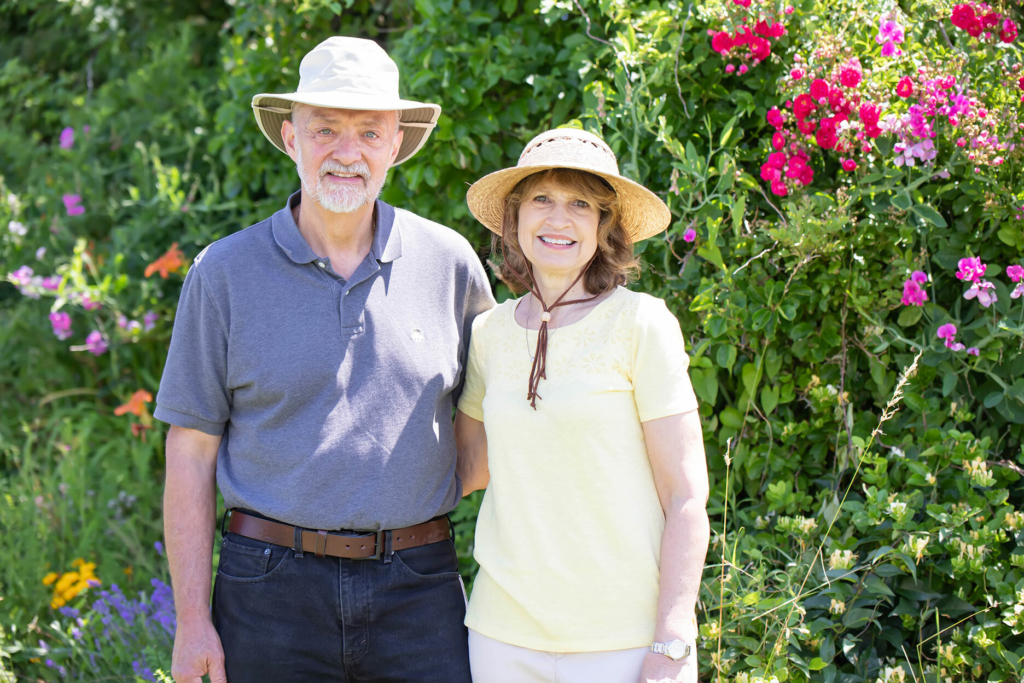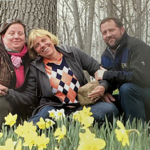Partners in Education
As founders of the Southeastern New England Educational and Charitable Foundation (SNEC), Sharon Grills Jackson and Stephen Jackson ’15 (Ph.D.) believe that hands-on learning opportunities are vital to a student’s educational experience. With its focus on historic preservation and environmental conservation, the Rose Island Field School interdisciplinary research project perfectly aligned with the foundation’s areas of interest and emphasis on experiential learning.
“We emphasize very much in our involvement the engagement and hands-on experiences of the students,” Sharon Jackson said. The couple joined faculty and other guests for the June 2022 tour of Rose Island, where students shared various research and projects under way as part of the summer program.
“This whole project embodied experiential learning,” she added. “The students were very knowledgeable in the areas in which they were concentrating their studies. It was wonderful to see the melding of the two areas in which SNEC is focused – the intertwining of environmental and historic preservation and how one is so impactful to the other. The students demonstrated that they got something out of it and the feedback from the instructor was very positive.”
“We insist on direct student impact,” Stephen Jackson said. “If we support the purchase of equipment, it has to be in the hands of the students.”
One of the pillars of SNEC’s mission is “to improve access to higher education for students with an interest in historic preservation or environmental conservation.” Founded in 2016, the foundation supports student-centered projects at higher education institutions.
Given Salve’s focus on purpose-driven education, SNEC has been a generous partner on a number of initiatives over the past six years. Collaborations include: the Grills lecture series and internships in historic preservation; student involvement in research and restoration of Ochre Court’s historic landscape; and funding for equipment such as a 3D laser scanner and ground-penetrating radar unit, which enable students to work with state-of-the-art tools that are standard within the profession.
The Jacksons were inspired to launch the SNEC Foundation by Sharon’s father, Richard Grills, a textile worker who spent 25 years at the helm of the Bradford Dying Association, a vital economic force in the Westerly, Rhode Island area. Grills’ lifelong interest in historic preservation and the environment led to the establishment of the foundation shortly before his passing in 2017.
“Those were areas of interest for my father,” Sharon Jackson said. “He donated acres of land to the Nature Conservancy and that ended up being part of Westerly Land Trust. Historic preservation comes from two aspects of dad’s life. He loved to rebuild stone walls on his property, and he also took apart his home piece by piece and rebuilt it to be the same historically accurate structure that it was originally; it was over 300 years old. He’d always been interested in these things, and we established the foundation in his honor.”
True partners in education, the Jacksons enjoy connecting with students who are impacted by the foundation’s support. They’ve found that students are sometimes surprised by their interest in the work and research conducted in conjunction with various projects.
“Steve and I enjoy seeing the product of the opportunities that we provided,” Sharon Jackson said. “It’s an integral part for us and that’s what I think some donors miss. The feedback that we’ve gotten is that students have changed what they were going to do after the experiences we were able to provide. That kind of opportunity is very rewarding to us.”
“It’s a little humbling, too,” Stephen Jackson added. “We weren’t expecting people to say you’ve changed my life. When we say ‘partnership,’ it’s not a throwaway word. We really do want to be involved with students and interact with them at the appropriate time.”
“It’s important for them to realize that SNEC is people,” Sharon Jackson said. “They might hear the name of any foundation and think ‘thank you, fine’ but we want them to know that it’s people who are interested in contributing to their education.”




